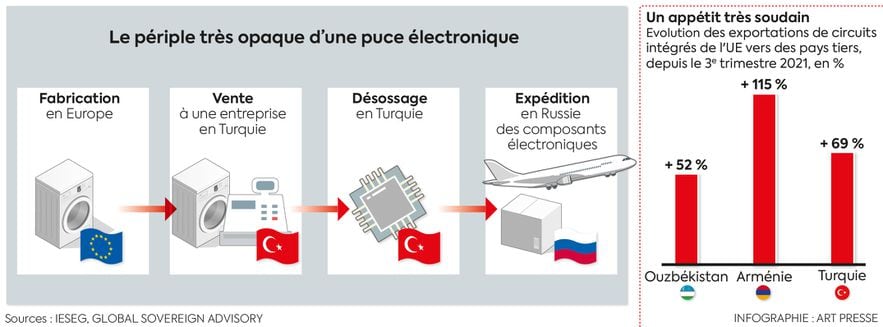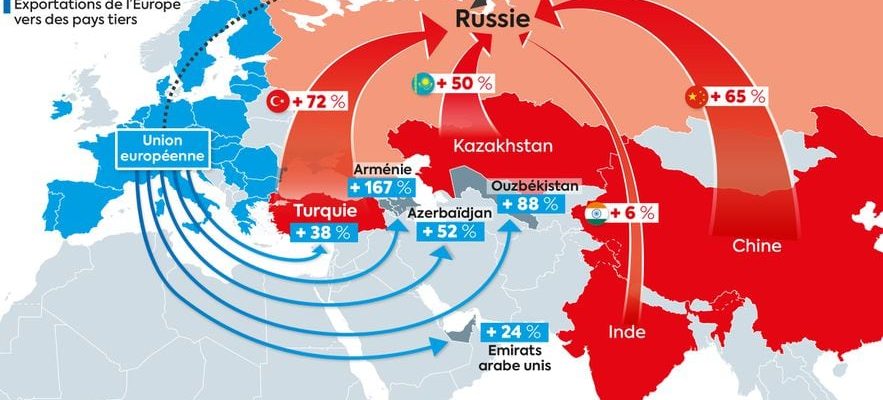This is the story of a list that has panicked European chancelleries for several days. The inventory of around ten large continental companies suspected of using the maze of their Asian subsidiaries to circumvent the economic sanctions hitting Russia. Tuesday February 13, in a discreet meeting room at the Berlaymont, the headquarters of the European Commission in Brussels, the atmosphere is sepulchral. A bit as if the air was running out. Mairead McGuinness, the Irish Commissioner for Financial Services, brought together all the representatives of the 27 Member States responsible for monitoring and implementing the retaliatory measures voted against the regime of Vladimir Putin. This is the fourth time since the start of the war in Ukraine that this group of diplomats and senior officials have met.
That day, France dispatched the deputy director general of the Treasury, Muriel Lacoue-Labarthe. David O’Sullivan, an old hand in the Brussels mysteries and former EU ambassador to Washington, is in charge. He hands each person a sheet. A dark list of European companies caught red-handed. For weeks, the European Commission’s sleuths have been combing through Russian customs data and dissecting the codes assigned to each product. The equivalent of around ten billion euros of products whose trade is prohibited with Moscow are said to have crossed Russian borders from Asia. A few days later, at Bercy, they tried in vain to delay. No, the list will not be made public. It would be too early to speak of proven suspicions… After all, these could be deliveries corresponding to queues of contracts, coding errors, simple oversights… or obviously clear attempts to circumvent sanctions. It’s now up to French customs to investigate. And if circumvention is proven, then the company will be liable to legal action. Over the past two years and the avalanche of sanctions, several avenues have been followed. None of them has been resolved in court.
Since March 2022, 12 sets of sanctions have however been passed by the European Union, joining in most cases those taken by the United States, the United Kingdom, Australia, Japan and even South Korea. A thirteenth packet was even voted on this Wednesday, February 21, a few days before the second anniversary of the Russian invasion of Ukraine. Today, nearly 18,000 measures precisely regulate the trade of thousands of goods, sectors, individuals or companies. “We have never been this far,” confirms Alexandre Celse, a lawyer specializing in customs issues at the Arsene law firm. Russia is now doing “better” than Iran or Cuba… Sad medal. And yet the Russian economy has not collapsed. While growth rose to 3% last year, it is expected to reach 2.6% this year, according to the latest IMF forecasts. A resistance which had not been anticipated by the Europeans, and which makes the pessimists and all those who have a pro-Russian agenda say that the sanctions are paper.
Diverted trade to Russia.
© / Art Press
Transit through third countries, false customs declarations…
“It’s false! When we see the number of campaigns carried out by Russia on social networks to convince Westerners of the ineffectiveness of sanctions and that they are especially painful for Europeans, we realize to what extent this subject is actually crucial for Moscow”, remarks Nathalie Loiseau, MEP (Horizons). “Russian revenues fell by 30% with the fall in oil exports. As for purchases of technological products, they fell by 40%,” continues the former Minister of European Affairs. Semiconductors, smart cards, optics… so many technologies whose deliveries the Westerners banned from the start of the invasion. A thorny problem for the Russian state, which does not have the industrial capacities to replenish its stocks. The military-industrial complex was hit hard, as was aeronautics. The maintenance of the commercial fleet raises questions: 74 air incidents were recorded last year according to Jacdec, a German company which tracks security flaws in civil aviation. This is twice as much as in 2022…
Of course, Moscow quickly looked for ways to circumvent these sanctions. And in this area, we must recognize the Russians as having a certain talent. “Throughout the Soviet era, and despite the Iron Curtain, they deployed treasures of imagination to create parallel circuits and obtain foreign goods,” recalls the writer Iegor Gran. “This art of resourcefulness, they grew up with it. It serves them today.” Transit through third countries, false customs declarations… All roads lead to Moscow. For Westerners, the subject is all the more complex as certain technologies, called dual, are used for both civil and military applications. For example, integrated circuits, which are found in washing machines as well as in missile warheads…
In short, the system is porous. An estimated €2.6 billion worth of Western-made components that could be used for military purposes entered Russia last year. “Nearly 3,000 foreign components were found in Ukraine in Russian and Iranian weapons,” denounces Andrii Pozniak, expert on sanctions at the National Agency for the Prevention of Corruption.

The very opaque journey of an electronic chip.
© / Art Press
Turkey’s new role
Another list emanating once again from the European Commission, dating from September 14 and which L’Express obtained, illustrates the extent of the phenomenon: for nearly 120 types of products, Russian imports from Asia Central, Turkey, Serbia, Thailand and Vietnam have jumped by more than 100% over the last twelve months. Certainly, part of these deliveries illustrate the reorientation of Russian purchases… Only part.

Central Asia, hub.
© / Art Press
From the start of the war, Turkey, which skilfully knows how to play both sides, found a new role for itself in the global trade map: a reshipment platform. In Istanbul and Ankara, hundreds of “buffer companies” have emerged in recent months. The Turkish Union of Chambers and Commodity Exchange estimates at 2,000 the number of wholesale trading companies established by Russian businessmen between February 2022 and summer 2023. Parallel trade strongly encouraged by the Kremlin, even if he pays the full price. The median price of Turkish exports to Russia has increased by 80% over the past two years, according to calculations by Agathe Desmarais, economist at the European Council on Foreign Relations.
Certainly, over the course of the sanctions packages, Western companies have found themselves obliged to ensure the good faith of their customers. Conversely, in steel for example, of which Russia is historically a large producer, European buyers are now required to verify that their purchases do not contain the slightest gram of Russian steel, even if they come from a third country. . However, there are always holes in the racket.
Cat and mouse game
Katerina Zabrodkina, a Russian consultant specializing in the automotive industry, knows the flaws in the system by heart. She spends her life between Saint Petersburg and Bishkek, Kyrgyzstan. The young woman estimates that nearly 114,000 new cars from Western, Korean or Japanese brands were sold last year in Russia, or nearly 13% of total registrations. How did they get in? Unscrupulous distributors sell new vehicles to Kazakh importers who take them to Kyrgyzstan where they are registered, their value reduced to limit customs duties. The cars are then shipped to Russia, both countries being part of the same free trade zone. Each product has its own commercial route. “Whatever you want, business will always remain business. As long as there is demand, there will be supply,” she concludes at the end of our exchange.
Unearthing the loopholes, filling them: a game of cat and mouse played by Western legislators. “Above all, we should create an international sanctions verification agency. Because each Member State does its own thing,” suggests Nathalie Loiseau. As for further strengthening the arsenal, many believe that we could go further in the sanctions hitting Russian hydrocarbons. Ironically, if the taps on European gas pipelines are closed, Russian gas still arrives in Europe, now by ship, in the form of liquefied natural gas (LNG). According to scores produced by the Institute for Energy and Financial Analysis, an American think tank, France was, between January and September 2023, the second largest importer of Russian LNG, behind Spain and ahead of Belgium. A trade, so far, completely legal.
.
